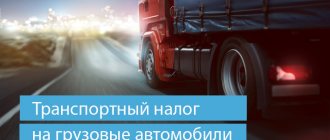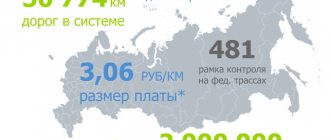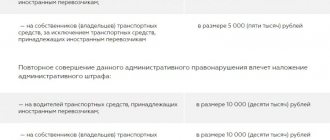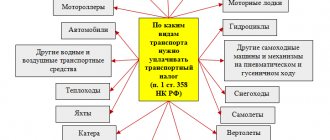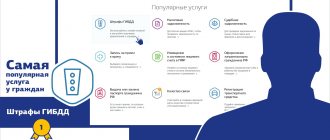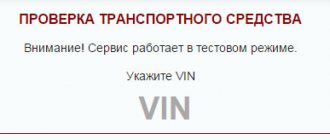"Plato" - what is it?
It’s worth starting, perhaps, with the very name of the system. So, contrary to popular belief, the program got its name not in honor of the ancient Greek philosopher, but from the abbreviation of the phrase “payment per ton”. So what is this system?
According to the program, drivers of any vehicles weighing 12 tons or more must be entered into a special database. What is it for? As the developers of the system in question assure, the main goal of the program is to improve the road surface in Russia. Every year, heavy trucks cause significant damage to roads, causing the condition of the road to deteriorate significantly. Thanks to the Platon database, every driver of large vehicles will be able to contribute to the restoration system of Russian roads. In this case, practically no budgetary funds will be spent, except perhaps on the purchase of equipment for the operation of the database.
Description of the system operation
To pay the fee, the Truck Owner is required to register himself and the vehicle in the Toll System Register.
Registration in the system
Through your Personal Account, self-service terminals or at User Information Support Centers
Personal Area
After checking the data, the user receives a login and password to access the Personal Account
Pay a fee
The car owner must top up the account and issue a Route Card before driving
How does Plato work?
“Platon” is a road payment system that works according to several basic principles. The first of them is advances. The trucker can send a certain amount of money just before leaving. The second option is to pay for the kilometers traveled. In the same way, a certain amount of money is paid before leaving for the highway, but with a small addition: a special on-board computer is installed in the truck driver’s cabin, linked to the GLONASS satellite system.
And finally, the third option is still unfinished. We are talking about hanging frames that are part of the Plato system. A truck driver, driving through special electromagnetic-type structures, “gives” information about the kilometers traveled.
You can pay for the “knurled” kilometers at any ATM where this is possible, or in your personal account on the Platon.ru website.
How does the system work?
At the end of autumn 2015, a special system was introduced in Russia. It is intended to pay for travel on modern federal roads. She is known as "Plato".
To understand what such a system is, you should study its main functional purposes. It is required to perform operations such as:
- Processing of information data.
- Collection of up-to-date information.
- Reliable storage of information data on the movement of freight vehicles in real time.
Access to the system is provided to drivers and entrepreneurs free of charge. But to receive it you will need to register on the program portal. Although access is provided free of charge, a monthly fee is required for the service. It is about 500 rubles per month.
How the system works
After gaining access to the quality control and payment system, specialists install a special on-board device or a full-fledged computer on the car.
As soon as the specialist activates the device, the system will begin to determine geolocation coordinates. Having collected the data, it will send it to the information processing center through the connection of the operator used.
The information that the center receives is carefully studied, processed and systematized. After the analysis, the program issues an invoice to the company or individual entrepreneur for movement on federal roads. The invoice is generated based on the tariff rate in effect at the time of travel.
"Plato" operates exclusively in automatic mode. The software includes built-in maps of the location of toll roads. The program independently records when the vehicle has left the toll road and immediately goes into standby mode.
The corresponding information enters the system if a car simply moves from one toll section to another. They usually differ in the amount of the bet, and this is important to take into account in order to issue the correct invoice.
How did you come up with "Plato"?
As already mentioned, the main reason for the appearance of the system in question is the poor condition of the roads. Every year, federal highways suffer from the passage of heavy vehicles. For example, the damage to one car weighing 12 tons is equal to the damage from the passage of almost 40 thousand cars. On a national scale, about 1 trillion rubles are spent on road restoration every year. Naturally, this amount is not enough.
The Russian authorities decided to take an example from European countries, where systems similar to Plato have been in operation for a long time. Toll roads, payment for road restoration, large tax fees - all this is a normal reality for European truckers. The idea to adopt such a system belongs to the Federal Highway Agency; The program operator is RT-Invest Transport Systems LLC. All funds raised must be transferred to the FDA.
Documents and regulations
The grounds for creating a toll collection system are the following documents and regulations:
Transport strategy of the Russian Federation for the period until 2020
The transport strategy of the Russian Federation for the period until 2020, approved by order of the Ministry of Transport of Russia dated May 12, 2005 No. 45, determines the directions for the development of the transport system and is based on the draft Concept of long-term socio-economic development of Russia.
Transport strategy of the Russian Federation for the period until 2030
The Transport Strategy of the Russian Federation for the period until 2030, approved by Decree of the Government of the Russian Federation of November 22, 2008 No. 1734-r, determines the directions for the development of the transport system and is based on the draft Concept of long-term socio-economic development of Russia.
Federal Law No. 257-FZ dated November 8, 2007 (as amended on December 27, 2018) “On highways and road activities in the Russian Federation”
The law establishes the procedure for the movement of vehicles with a permissible maximum weight over 12 tons on federal roads
Federal Law of 06.04. 2011 No. 68-FZ (as amended on December 14, 2015)
On amendments to the budget code of the Russian Federation and certain legislative acts
Decree of the Government of the Russian Federation of November 17, 2010 No. 928
On the list of public roads of federal significance
Order of the Government of the Russian Federation dated August 29, 2014 No. 1662-r
On concluding a concession agreement with RT-Invest Transport Systems LLC for the implementation of the Platon toll collection system
Decree of the Government of the Russian Federation No. 1191 as amended on June 29, 2019 (fee amount and coefficient)
On some issues of collecting fees to compensate for damage caused to public roads of federal significance by vehicles with a maximum permitted weight of over 12 tons
Decree of the Government of the Russian Federation of May 18, 2015 No. 474
On suspension and amendment of certain acts of the Government of the Russian Federation
System implementation process
Having figured out what “Platon” is on the roads of the Russian Federation, it is worth paying attention to another important issue. It concerns the implementation of the program in question. Is the system fully operational today or are only some parts of the program adopted?
Owners of heavy trucks have been warned for a long time that the program in question will appear soon. Since its announcement, the system has caused quite a strong reaction. Opinions about "Plato" were very different; at the same time, no one doubted that the program would certainly greatly change the lives of truckers. In August 2015, the first steps towards registering car owners began. Getting onto the list was based on the principle of “large to small”. By September 2021, there were about 600 thousand heavy vehicles in the system, 13% of which belonged to individual entrepreneurs, 20% to private car owners, and another 9% to foreign citizens.
Tariffs “Platon”: latest news
Since the introduction of this toll system, tariffs for travel on federal roads have already been revised several times.
Read about changes in Plato rates in 2021 and the coming 2021 in the article: “New tariffs of the Plato system in 2021.”
Let us remind you that knowledge of the tariff is usually necessary with a prepaid payment system, since an amount sufficient to be debited for the route must be deposited into your personal account in full.
Let us also remind you that there are a large number of payment methods at Plato:
| PAYMENT FOR “PLATON” ROUTE CARD | REPLENISHING YOUR ACCOUNT RECORD “PLATON” |
|
|
Spending of revenues into the system
It’s worth talking in a little more detail about how the money coming into the Platon system is spent. The road toll system, as is known, aims to repair the road surface. Funds coming into the system will go to both the federal highway agency and private government partnerships. According to government plans, revenue from the program should be about 40 billion rubles annually. This will make it possible to repair the bulk of roads by 2021.
Regional road funds, which will receive funds from Platon, are required to report to the FDA. This will allow us to quickly implement all significant municipal projects. According to the Russian authorities, the program will allow for the repair of large bridges, highways, tunnels, multiple overpasses and other similar objects. The Ministry of Transport even claims that Platon will not only improve the quality of roads, but also optimize the delivery of goods.
How much does Plato cost?
In the Platon system, payment is made through the user’s personal account. This can also be done through a terminal, mobile device, by making a bank payment to the operator’s account, or directly at the user support center office.
Let's consider the question of how much the Platon costs, or more precisely, how much the owner of the truck will have to pay for each kilometer of the road when carrying out transportation. In the Platon system, tariffs have not actually been revised since the beginning of its launch. That is, since the launch of the system, a tariff of 1.53 rubles per kilometer has actually been in effect and is in effect.
Board size
It’s finally worth moving on to the most important and interesting point - money. The question of what “Plato” is on the roads is best characterized by exact numbers. Thus, until February 2021, the tariff for crossing one kilometer on a toll highway was one and a half rubles (1.5293 rubles per km). Since March 2021, the fare for one kilometer has increased to 3.06 rubles. According to the program developers, this figure will last until the end of 2021. Is this rate high? If we compare it with Belarus, where the rate is six times higher, then no. If compared with European countries, then our percentages will be completely insignificant in comparison with European ones (for example, the Austrian tariff as of 2021 is 20 times higher than the Russian one).
So what's the problem? Why are so many truckers protesting across the country? Is it a matter of simple greed, unwillingness to give an extra penny for the development of the road system? Unfortunately, everything is not so simple here. The problems of the system under consideration will be discussed further.
Fees for “Plato” will become a tax
The likelihood that fees under the Plato system will be included in the list of taxes is becoming increasingly higher. On April 1, the Ministry of Finance submitted for public discussion draft relevant amendments to the Tax Code. The agency expects that they will come into force on January 1, 2020.
Thus, in accordance with the amendments to the Tax Code of the Russian Federation, among other things, “Fees for the use of public federal roads” will be included Now, we note that the procedure for collecting tolls for trucks weighing 12 tons or more on federal highways is regulated by separate government regulations.
In principle, the payment procedure itself with the inclusion of fees in the list of taxes will not change : funds will either be automatically debited when using the on-board device, or transferred to the account of the system operator when issuing a route card. You will not be required to complete any tax return.
“Communication” with the Federal Tax Service (at least for as long as the concession agreement between RT-Invest Transport Systems and Rosavtodor is in effect) will occur through the system operator : in the event of no payment, the operator will have to draw up a statement of debt and send it to the tax authority within 5 days . The provision of such an act, as stated in the draft Tax Code, will become “the basis for the tax authority to draw up a document identifying arrears .”
It will be possible to challenge the fact that a debt has been identified either through Rosavtodor or in court.
At the same time, what is noteworthy is that the tariff for travel along 1 km of the federal highway is 3.73 rubles . Let us remind you that it is considered full (and at one time they planned to achieve it by a phased increase), and the current rate of 1.90 rubles is preferential (0.51 rates). By the way, there is not a word .
In turn, the fine for non-payment of travel will, in all likelihood, cease to be fixed (5 thousand rubles for a primary violation, 10 thousand rubles for a repeated violation) and will depend directly on the amount of debt . In the project provided by the Ministry of Finance for the period from January 1, 2020 to December 31, 2029, approximately 10% of this amount .
Note: it was previously reported that the Ministry of Finance is going to introduce fees under the Platon system into the Tax Code. Along with them, they also want to include an environmental tax, a recycling fee, a tax on communication network operators and a hotel tax. Fees for providing information from state registers will also be introduced into the Tax Code.
Representatives of the interests of Russian business - the Chamber of Commerce and Industry of the Russian Federation, the Russian Union of Industrialists and Entrepreneurs, "Business Russia" and "Opora Rossii" - have already even managed to appeal to President Vladimir Putin with a request to influence the Ministry of Finance and thus prevent an increase in the number of taxes.
At the same time, one of the main concerns of business associations is connected not so much with the possible increase in the fiscal burden, but with the fact that inclusion in the Tax Code means the possibility of bringing non-payers to criminal liability .
Now the Ministry of Finance’s project, despite the appeal to the President, is undergoing public discussion. It will last until April 26 of this year and means that until this time everyone can express their comments on the document.
Who owns Plato?
The Platon toll road system is controlled by the state through the Russian Automobile Road Agency (Rosavtodor). The authority entered into a contract with a private company. As a result of the conclusion of the agreement, a special infrastructure was created, which received the name “Platon”.
RTITS, according to the clauses of the concluded agreement, is obliged to build the entire system at its own expense. For 13 years, “Platon” has been used by RT-Invest, after which it goes into the hands of the state. RTITS transfers all money received to the Russian budget (according to forecasts, the company should collect $15 billion by 2029). In return, the company will receive a reward of 10 billion rubles. The operator of RTITS is Igor Rotenberg, who owns 50% of the company's shares. Igor is the son of Arkady Rotenberg, a major businessman and friend of Vladimir Putin.
The Russian service of the BBC (“BBC”) was able to find out that the economic data provided by the Ministry of Transport of the Russian Federation was compiled incorrectly. In short, the cost allocation formula contains a coefficient of damage from freight vehicles based on the ratio of reduction to passenger cars. Even the Ministry of Economic Development tried to argue with the Ministry of Transport, but to no avail. The BBC claims that the body manipulates the figures deliberately - in order to ensure that the program receives at least zero profit.
What are truckers unhappy with?
Probably, none of the truck drivers have been asking the question for a long time about what “Plato” is on the roads. The system has become incredibly popular not only in narrow circles, but throughout Russia. Probably every citizen has already been notified of the existence of the program in question. What is the reason for such ardent popularity of the system? The source, as usual, lies in severe injustice. It is worth giving a simple example.
A citizen purchased three heavy trucks on lease. To pay for the cars, he must drive at least 20 thousand kilometers. For one small flight you can earn an average of 50 thousand rubles. Half of the amount goes to pay for fuel - 25 thousand remains. The car can make a maximum of 7 flights per month. It turns out about 175 thousand rubles. 50 thousand are spent on repairs, 70 thousand on leasing payments. 40 thousand rubles are spent on salaries for the truckers themselves. 30 thousand remain. The question arises about which roads Plato operates on. It turns out that almost everyone. The system affects federal roads. “Plato” can thus take about 20 thousand rubles from the pocket of the citizen in question. The result is a payment of a little more than 10 thousand rubles.
What kind of development of cargo transportation, which was referred to in the Ministry of Transport, can we talk about in such situations? When paying attention to European tariffs, you should first take into account the simple fact that incomes in the West are much higher. Unfortunately, the current authorities did not pay attention to this.
Legal claims to the system
The main complaint about the program is the non-competitive selection of the management company. Moreover, in 2013, the government organized a competition for participation in similar systems. For some reason, “Plato” was not included in it - in 2014, the head of Rostekhnologii referred to sanctions, due to which one should “pay less attention to Western experience.” The government independently determined the concessionaire - it became the RTITS company.
Many citizens were outraged not even by the non-competitive basis for selecting the concessionaire, but by the way exactly the RTITS operates. The thing is that the company not only collects money from truckers, but also receives a considerable reward from the state. However, from a legal point of view, everything is correct here: the company creates a system and transfers it to the customer - the state, which later pays the contractor a remuneration. Much more questions arise when looking at economic rather than legal claims.
How to use the Platon system
Payment for kilometers traveled on the federal highway is paid by the driver of a heavy truck either in advance or accrued upon passing through special road boundaries. The driver must register on the system website and provide all the necessary documents to register the vehicle. After registering, the driver has the right to choose how to use the system:
- preparation of a route map;
- using an on-board device.
The first option involves issuing a special document - a route map. To do this, you need to decide on the route in advance and strictly follow it when moving. If the driver deviates from the route, this will be considered a violation and will require payment of a fine. The route map can be obtained from the nearest system service center. The driver of a multi-ton vehicle is charged before the trip. All this, frankly speaking, is not very convenient.
The second option is more preferable. In this case, the driver of a heavy truck receives a special on-board device from the highway. It is issued free of charge. Each such device becomes assigned to a specific vehicle, that is, it cannot be installed in another car or replaced with any analogue.
You can connect the device to the cigarette lighter. The indicator shows the current balance, communication status, number of satellites. Kilometers traveled are calculated using satellite communications. The balance must be replenished in advance, since funds are debited in real time. Collection of funds is carried out automatically when a multi-ton truck passes special equipment placed on frame structures above the surface of the road, or past mobile points - vehicles with special equipment installed on them. That is, no additional actions will be required from the driver other than timely replenishment of the account.
Installation of an on-board device is not mandatory; it is not required by law. The owner of a heavy vehicle is required to have a current account, which he can top up from a bank card. For this purpose, a personal account is provided on the Platon system website. To top up your account, you can use online services, Platon self-service terminals or the QiWi partner network.
In addition, for payment you can use not only bank cards, but also special fuel cards DKV and E100. No commission is charged.
To access the services provided in your personal account from a mobile device (smartphone or tablet), you can use the appropriate mobile application. It is available for free download on Google Play and AppStore.
The Plato application is available to all smartphone owners
Economic claims to the system
What will the huge taxes on transportation, mass layoffs of truck drivers and the emphasis on toll roads in Russia lead to? "Plato", according to many experts, will cause enormous damage to the country's economy. It will primarily affect ordinary citizens. In short, an increase in rates will inevitably affect the prices of any goods in the state. Moreover, it is already reflected. In just a few months after the system went into effect, prices on store shelves increased significantly. Both experts and third-party companies are worried. Thus, the Coca-Cola Company announced the possible loss of 20% of organizational transport. The head of Rosavtodor also expressed his concerns.
What should truckers do?
It is obvious that when asked what cargo carriers should do, many will answer in one word: protest. Of course, protests have a noticeable impact on the entire system under consideration. More people will learn about the program, after which they will also express their dissatisfaction. But there are citizens with hopeless situations who have no choice but to work. What advice should be given to such individuals?
- It is necessary to learn more about the federal highways controlled by the Platon system. Which roads are not federal? Is it possible to get to your destination not by a major highway, but by a narrow-gauge railway? All truck drivers should seriously think about this.
- You can legally use the toll road. To do this, it is worth answering the question of how much the roads included in Plato cost. Russia is a country with many routes and interchanges, and therefore you can almost always find economical options.
- There is an option to transfer to a vehicle weighing less than 12 tons.
If none of the options presented is suitable, you will have to pay.
Operating principles of the system
Advance payment scheme or postpayment
Payment is made by the owner of the vehicle before driving on federal highways or in post-payment mode, based on the amount of the fee approved by the Government of the Russian Federation.
Payment for the actual distance traveled
The owner of the vehicle pays a fee to compensate for damage for each kilometer of the route along the federal highway, using a choice of one of the options for calculating the fee:
Registration of a route card requires payment of a fee for a one-time route.
When using an on-board device, funds are debited from the vehicle owner's account to pay for the fee automatically, which eliminates errors due to the influence of the human factor.
Use of satellite navigation systems
Positioning of vehicles with a permissible maximum weight of over 12 tons is carried out using on-board devices that provide reception of signals from the global navigation satellite systems GLONASS and GPS.

